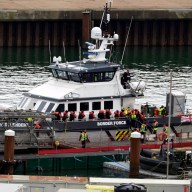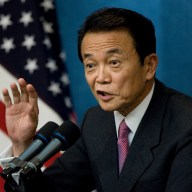 Gemma Arterton plays a vampire on the run from evil men in “Byzantium.”
Gemma Arterton plays a vampire on the run from evil men in “Byzantium.”
Credit: The Weinstein Company
Gemma Arterton is a Bond girl, but being a Bond girl in the 21st century is different than in the 20th. A small bit in “Quantum of Solace” led to leading roles in other big-budget productions like “Prince of Persia,” “Clash of the Titans” and “Hansel and Gretel: Witch Hunters.” But she’s made sure to do enough smaller films, like “The Disappearance of Alice Creed,” to remind viewers of her deep history in theater. She currently has two new movies in American theaters: “Unfinished Song” is a dramedy/weepie where she leads a chorus of old singers, including Vanessa Redgrave; and in “Byzantium,” from “Interview With the Vampire” director Neil Jordan, she’s a bloodsucker perpetually on the run with daughter Saoirse Ronan.
“Byzantium” is one of those vampire films that goes out of its way to avoid being a traditional vampire film.
I was approached really early on, when the script was still based on a play. It was totally different. The vampire aspect was a figment of the girl, Eleanor’s, imagination. It was more about mental illness and abuse, with this girl saying to her psychologist that she was living with a vampire. What attracted me was this weird relationship between the girl and her mother. When Neil [Jordan] came on, he decided to make it more of a vampire movie. But that relationship remained. It felt similar to my own childhood. I was raised with two women, my sister and my mother, who was very young.
It’s noticeably smaller in scale than “Interview With the Vampire,” which was mostly about men.
It’s hard to make movies about women, especially when they’re strong. It was really hard to make this. There was a big actor lined up for the Darvel part, which Sam Riley played. He dropped out at the last minute, and all the financing fell through — even though the part wasn’t that big. We all agreed to do it for half the fee. It was hard, but we did it.
Does doing a film like this on a relatively small budget give everyone the drive to make it even better?
I think it was frustrating for Neil because he’s so grand in his vision. I liked that because I think it had to be dilapidated. This film is grand and dilapidated at the same time. We had to get creative and work out how to do that. I like that, as stressful as it is for the production. Having worked on big budget films where there’s an abundance of money, sometimes you can get a bit slow. Like “C’mon let’s just do it!” When you have no money it gives it an edge.
What has been your experience with bigger films?
I had really bad experiences on big budget movies, and I’ve had good experiences as well. With “Hansel and Gretel,” I was very involved, very much in the loop. Other ones, you’re treated like a little pawn to be moved around. I found that very frustrating coming from theater, where you’re so in it.
Is it possible to force your personality onto some of these bigger productions?
You do it, and usually they cut it. That’s what happens a lot. You get the first script and you think, “This is cool.” Then they bring in 12 other writers, and then they change it. And then in the edit, they change it totally. I find that really frustrating. When I do a play, you don’t f— with a play. The play is the play. With film you can edit it and change it and do what you want. I got to a point in my career where I don’t want to do this anymore. I made a decision not to do that type of film.
You just wrapped “The Voices,” which was made by Marjane Satrapi (“Persepolis”), and you have another film with French filmmaker Anne Fontaine. Were you consciously seeking out women directors?
I never worked with a female director professionally before, even on stage. There are so many good ones out there. I don’t want it to seem weird, but working with a woman is so much more liberating when you’re a woman, because you don’t have to worry about anything.
You’re learning French for the Fontaine film?
Yes. I’ve been learning it for a month. I speak loads of languages badly, all about the same. I was like before I’m 30 I need to speak fluent something. I love French cinema and Belgian cinema, and I thought if I can get a language under my belt, those are good ones to get into. Anne was telling me when she made “Coco Before Chanel,” she needed to find an American actor who spoke French. Bradley Cooper could, but he wasn’t that well known at the time. She said she had so much difficulty finding English-speaking actors who spoke French. There aren’t many because people just say, “We speak English, we don’t need to speak another language.”
You’ve said that you weren’t ashamed of being a Bond girl in “Quantum of Solace.”
Yeah, I loved it. [Laughs] Because I wasn’t really in it that much. I wasn’t the main one. I always thought I’d just be a theater actor so I thought it’d be cool to do a Bond film and then go back to theater, and then do that forever. People always say there’s a curse of the Bond girl, but there are so many — like Rosamund Pike, I think she’s such a good actress, and she’s gone off and done other things. And Eva [Green]’s done loads. It’s not really true anymore. It’s like with any role. If you play Jason Bourne, you have to make sure you do something else. People like to put you in boxes. You have to keep changing it.
















